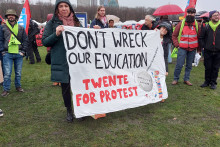Now the Schoof cabinet has submitted its budget for 2025, it’s becoming increasingly clear what the cutbacks will entail. The response by students, education institutions, researchers and employers is quite harsh, although some are also trying to see the positive.
Students
The slow-progress penalty in particular is angering students. Whoever takes longer than one year extra to finish their studies, will pay three thousand euros extra in tuition fees. This is to bring in over 280 million euros per year.
Studying is becoming less accessible, the Dutch National Students' Association (ISO) says in response. Some young people won’t dare to enrol in a degree programme any more. The Dutch Student Union also thinks the plan doesn’t make sense: ‘As the cabinet, you’re shooting yourself in the foot very hard, because in concrete terms there will be fewer staff in healthcare, technology and education.’
And that’s not all they’re frustrated about. They think the compensation for students belonging to the bad luck generation is too low, and there are more things that are making life expensive. Examples given by ISO include the increasing tuition fees, the inadequate basic student grant, more expensive textbooks and the interest on study debts.
Universities
The cutbacks on universities turn out to be even more far-reaching than announced in the outline agreement the four coalition parties concluded, a response by the universities states. Umbrella organisation Universities of the Netherlands (UNL) is especially miffed that they’re already taking effect next year.
The outline agreement included a cutback on the national collaboration of universities (sector plans). This was met with fierce criticism. The cabinet took this on board and is now cutting research grants the universities were allowed to distribute themselves (starter and incentive grants). But that cutback is already taking effect in 2025, Budget Day revealed.
‘This will increase the shock effect for universities’, says UNL. ‘The government is taking away research money that has already been allocated to young researchers and thus directly causing problems for universities.’
Higher vocational education
The universities of applied sciences aren’t all that affected, but they are very worried about the slow-progress penalty. Its mere announcement already inflicts damage, a response says. ‘The slow-progress penalty discourages young people from starting a study programme. Particularly in higher vocational education this effect is stronger, as there are many students there who are the first from their families to enrol in higher education or come from families with a lower income.’
Practice-oriented research is left untouched by the State Budget and the Netherlands Association of Universities of Applied Sciences calls this ‘a positive signal’. At the same time, higher vocational education would like to see ‘more ambition’ when it comes to reskilling and upskilling workers. Furthermore, the universities of applied sciences don’t understand why the ‘Internationalisering in Balans’ (Internationalisation in Equilibrium) act will also apply to them. There are no problems with internationalisation in higher vocational education, is their message.
Employers
Employers’ association VNO-NCW also has its reservations. ‘A government that structurally cuts one billion euros from higher education, research and innovation is taking a major risk for the economy in the long term’, a response reads. ‘These cuts may create some financial room now, but they will cost us our prosperity in the future.’
Research funding body NWO
Scientists with good plans can call on the Dutch Research Council, an organisation that distributes over a billion euros every year. NWO’s response is more sympathetic than that of the rest of the scientific world, but it can’t hide its concerns.
‘We understand the need for cuts and see a minister of OCW who has done his best to listen to the field’, it says rather mildly. ‘NWO is relieved that the sector plans have been retained. This is good news for the 1,200 or so recently appointed researchers at universities and UMCs, who were in danger of losing their jobs due to the cuts.’
But the cuts as a whole are still worrying, NWO feels. ‘Ultimately, this will lead to less knowledge, fewer innovations and fewer solved problems. While we so desperately need this as a country.’ The cutbacks are ‘bad news for our economy, our strategic autonomy and our broad social welfare’.
Planning agencies
The cabinet isn’t taking sufficient account of the long term, agree the planning agencies CPB, SCP and PBL, which conduct all kinds of studies into the consequences of policy. Another thing they do is verify the feasibility of election manifestos, if parties so desire.
In a joint reflection on the annual budget plan, they look at prosperity as a whole, but also specifically discuss the cuts in education, innovation and research. ‘It concerns a potential trade-off”, they write. “Even though the plans are currently creating financial space for government finances, they may be at the expense of broad prosperity in the future.’
They give the example of international students. Fewer European students means fewer expenses here and now: you don’t have to provide as much funding to higher education institutions if they have fewer students. But in the long term, international students actually bring in money, ‘because some of them stay in the Netherlands to live, work and pay taxes’, write the planning agencies.






